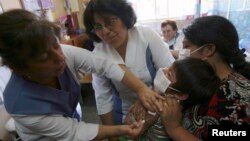The World Health Organization reports viral Hepatitis, which kills nearly 1.5 million people a year, could be eliminated. In marking World Hepatitis Day (July 28), WHO says intensifying testing, prevention and treatment efforts is key to tackling one of the world’s most serious diseases.
Viral hepatitis is a largely neglected disease. This may seem strange as this dangerous alphabet of infectious diseases - Hepatitis A,B,C,D, and E - kills nearly as many people as does HIV/AIDS. Hepatitis B and C are most well known and justifiably feared because they cause chronic liver cirrhosis and liver cancer, very often leading to death.
Hepatitis B is transmitted from an infected mother to her newborn baby, contact with infected blood and unprotected sex. Injected drug users are most at risk from Hepatitis C as the disease is spread through the unsafe sharing of needles.
Samuel So, a liver transplant surgeon at Stanford University in the United States, said prevention was the best cure for liver cancer as there was no effective chemotherapy to treat this disease, which is the second leading cause of cancer deaths after lung cancer.
Despite this, he said viral Hepatitis could be beaten - a view confirmed by health ministers who attended this year’s World Health Assembly. He called on countries to step up their activities now to eliminate these deadly diseases.
“We have a very effective vaccine for 30 years to prevent the future burden of Hepatitis B so they do not develop chronic Hepatitis and subsequent liver cirrhosis and liver cancer…In addition, there are now very effective drugs to treat chronic Hepatitis B, which is as simple as a pill a day and, like HIV, you can prevent disease progression to cirrhosis and liver cancer,” he said.
The World Health Organization reports more than one half billion people around the world are living with chronic viral hepatitis. About two-thirds of global deaths occur in Asia. The virus also is common in African countries.
Most people with hepatitis do not know they are infected. Symptoms usually appear decades after serious liver disease already has set in. This is why WHO urges governments to invest in effective prevention measures.
Nevertheless, Head of WHO's Global Hepatitis Program, Stefan Wiktor, said people have reason to be optimistic as great advances are being made in new treatments.
“Much of the recent excitement in the area of Hepatitis is because of the therapeutic revolution in Hepatitis C. We have a number of new medicines that have either been approved or a lot more that are about to be approved, which is really revolutionizing how we treat Hepatitis. It is shortening the course of treatment to as little as 12 weeks and in the future maybe even shorter. It is no more injections. These drugs are safe and they cure almost everybody - like 90-95 percent of people are cured,” said Wiktor.
But, money is a problem. Patients in the United States have to pay $84,000 for a 12-week course of treatment. Dr. Wiktor agreed this price was out of reach for most people in the world, especially in developing countries. However, he said he expected the price to come down rapidly.
He noted just last month, Egypt negotiated an agreement with the manufacturer to receive the drug at a cost of $900 per patient for the 12-week course of treatment.




